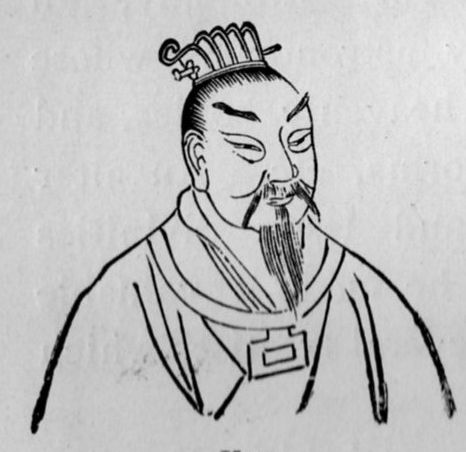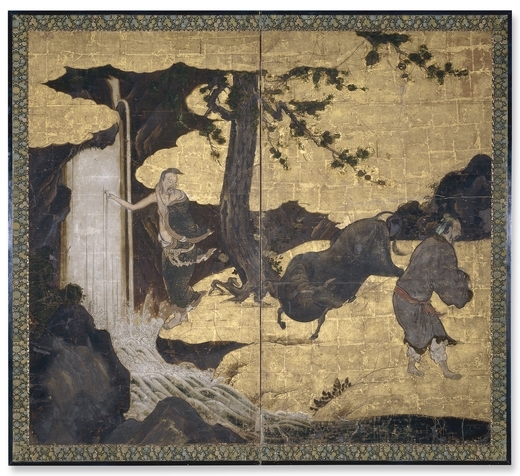Xu You (hermit) on:
[Wikipedia]
[Google]
[Amazon]
Xu You or Hsü Yu () was a legendary Chinese recluse who lived during the reign of the Emperor Yao (traditionally c. 2356–2255 BC), residing next to the Ying River. The emperor allegedly offered him the royal throne towards the end of his rule.

 Xu You denounced the society and retreated to the north of Ying River. Living a simple life, he scooped river water with his bare hands, even though he had a ''hulu'' (an ancient water bottle shaped like a gourd). Xu was a disciple of the female teacher Gnaw Gap, whom Xu described as "
Xu You denounced the society and retreated to the north of Ying River. Living a simple life, he scooped river water with his bare hands, even though he had a ''hulu'' (an ancient water bottle shaped like a gourd). Xu was a disciple of the female teacher Gnaw Gap, whom Xu described as "
Life

 Xu You denounced the society and retreated to the north of Ying River. Living a simple life, he scooped river water with his bare hands, even though he had a ''hulu'' (an ancient water bottle shaped like a gourd). Xu was a disciple of the female teacher Gnaw Gap, whom Xu described as "
Xu You denounced the society and retreated to the north of Ying River. Living a simple life, he scooped river water with his bare hands, even though he had a ''hulu'' (an ancient water bottle shaped like a gourd). Xu was a disciple of the female teacher Gnaw Gap, whom Xu described as "lending
In finance, a loan is the lending of money by one or more individuals, organizations, or other entities to other individuals, organizations, etc. The recipient (i.e., the borrower) incurs a debt and is usually liable to pay interest on that de ...
a myriad things ..senior to high antiquity but is not aged". The legendary ruler Emperor Yao regarded Xu with utmost respect and requested that he be his teacher. They shared a positive relationship, towards the end of Yao's rule (traditionally believed to be circa 2256 BC), the ruler chose Xu as his successor. (Much later, the Chinese sage Confucius
Confucius ( ; zh, s=, p=Kǒng Fūzǐ, "Master Kǒng"; or commonly zh, s=, p=Kǒngzǐ, labels=no; – ) was a Chinese philosopher and politician of the Spring and Autumn period who is traditionally considered the paragon of Chinese sages. C ...
greatly lauded Yao's decision to appoint Xu as the next emperor in line.) However, Xu refused to accept the throne, commenting that he had "no need for all under heaven". Legend goes on to state that an abashed Xu "washed out" his ears' contents into the Ying River, contaminating it. After Xu died, he was apparently buried at the summit of Mount Chi. The Han Dynasty
The Han dynasty (, ; ) was an imperial dynasty of China (202 BC – 9 AD, 25–220 AD), established by Liu Bang (Emperor Gao) and ruled by the House of Liu. The dynasty was preceded by the short-lived Qin dynasty (221–207 BC) and a warr ...
"Grand Historian" Sima Qian
Sima Qian (; ; ) was a Chinese historian of the early Han dynasty (206AD220). He is considered the father of Chinese historiography for his ''Records of the Grand Historian'', a general history of China covering more than two thousand years b ...
mentioned Xu in a chapter of his work ''Records of the Grand Historian
''Records of the Grand Historian'', also known by its Chinese name ''Shiji'', is a monumental history of China that is the first of China's 24 dynastic histories. The ''Records'' was written in the early 1st century by the ancient Chinese hist ...
''. Sima personally visited the alleged grave of Xu and wrote that Xu was an epitome of "highest virtue". Xu You is also depicted in a seventeenth-century Japanese artwork titled ''Xu You and Chao Fu'', illustrating the popular tale of another fellow hermit detouring from the Ying River because of the filth Xu had contributed to it by washing out his ears there. It is now housed at the British Museum
The British Museum is a public museum dedicated to human history, art and culture located in the Bloomsbury area of London. Its permanent collection of eight million works is among the largest and most comprehensive in existence. It docum ...
.
References
Bibliography
* {{cite book, author=Zhuangzi , year=1998 , title=Wandering on the Way: Early Taoist Tales and Parables of Chuang Tzu , publisher=University of Hawaii Press , isbn=978-0-8248-2038-1 , url=https://books.google.com/books?id=dpFnYhV_ghIC Legendary Chinese people